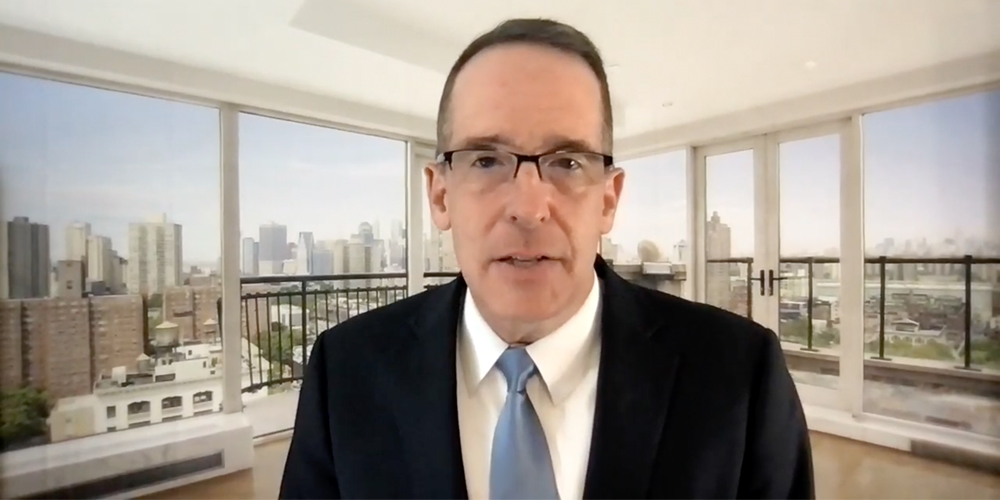An accomplished Adventist economist discusses similarities, suggests a way forward.

In which ways are economists like Seventh-day Adventists? According to Adventist economist David Beckworth, in several significant aspects.
“Adventists have been told to watch and warn. Economists have a very similar task. They are also called to watch and warn,” he told General Conference Executive Committee (GCEXCOM) members gathered for Annual Council on Friday, October 8, 2021.
Beckworth, a senior researcher, author, and former international economist at the U.S. Department of the Treasury, shared a video presentation at the Leadership and Education Development (LEAD) Conference at the Adventist Church’s headquarters in Silver Spring, Maryland, United States. He offered his perspective as an accomplished economist and a church member on finding resilience through crises.
Practice Humility
Using the acronym POD, Beckworth discussed principles for resilience. The P, he said, stands for practicing humility, an important quality to develop resilience.
“It keeps us from getting caught in the latest fads,” he said. “Thinking that can occur during a crisis can lead us to poor decision-making. It can also lead us to lose sight of our mission, to get so caught up in the moment that we lose sight of the fact that we are here to warn the world.”
Beckworth reminded leaders and members that as Seventh-day Adventists, we know where we are in prophetic history. Still, we need humility to understand every turn in human history, especially during crises. “As Seventh-day Adventists, we are called to watch and warn. We are given prophecy; we look at signs, then we give warnings to the world,” he explained. “It is essential to find balance in how we do this. We are called to watch and to warn, but we are also called to do it in humility.”
He quoted Adventist Church co-founder Ellen G. White, who in 1892 wrote, “We are not to live upon time excitement. We are not to be engrossed with speculations in regards to the times and the seasons which God has not revealed.”1
Economists have a very similar task, Beckworth said. They use forecasts — “we look forward; we try to see where the economy is going.” They use indicators to know the current state of the economy and warnings or guidance to those who need the information. However, “as economists,” Beckworth acknowledged, “we do not always do a great job.”
As Adventists we can learn from the experience of economists who have fallen short, he suggested. As Adventists, “we should practice humility in our watching, and we shouldn’t forget that it is easy to get caught up in the moment, and in doing that it distracts us from the task at hand, and thus we are not resilient during crises.”
Lessons from the Great Depression
Looking at an example of history in the 20th century, Beckworth acknowledged that practicing humility would have been good for economists and also for some Seventh-day Adventists.
The 1920s, he explained, were a decade of jubilance, euphoria, and good times. “There were lots of innovations, cars, appliances,” he shared. “Spirits were high, and people were feeling great.” The stock market kept going up, and unemployment was under 1 percent.
“What were economists thinking during the 1920s? Were they watching and warning? Did they see the dangers ahead? Or were they caught up in the moment as much as anybody else?” Beckworth asked.
He provided two examples. Famous economist John Maynard Keynes said in 1928, “We will not have any more crashes in our time.” “It was a very bold statement, and also a very wrong statement,” Beckworth said. Also, renowned and widely read economist Irving Fisher wrote in 1929, “Stock prices have reached what looks like a permanent high plateau.”
Caught Up in the Moment
According to Beckworth, “these economists were not practicing humility; they were also caught up in the times and the seasons around them.” Many argue that the financial crash and the catastrophic events of the next decade could have been avoided had economists done their job.
“So, how were Seventh-day Adventists during the Great Depression? Were they any better? Or did they too get caught up in the moment in their own way?” he asked.
“At the beginning of the economic crisis, Adventists were beginning to wonder whether this was it,” Beckworth shared. “Adventist publications were very sure the end was here. They were very certain the end was coming.” But decades before, White had warned, “Do present duties” “instead of exhausting the power of [y]our minds in speculations in regard to the times and seasons.”2
Beckworth said that it’s easy to get caught up in the moment. “But we need to have the humility to know we don’t have it all figured out,” he emphasized. “We need to practice humility in what we do.”
Occupy till He Comes
The second principle Beckworth mentioned was to be “occupied till He comes,” a notion based on the Bible parable of the talents recorded in Matthew 25. In the parable, the master goes away and leaves responsibilities to his workers. But one worker is terrified. “Maybe he was caught up in the moment, maybe he was not practicing humility,” Beckworth said. As a result, he didn’t do what he was told.
“We each have been called to different occupations, different callings in life,” he said. “But whatever God has called us to do, God tells us to occupy till He comes. He’s given us a task, and we need to fulfill it.”
According to Beckworth, in the biblical example of Noah, we see a perfect example of balance we could follow. “Noah was occupied for 120 years in a perfect balance of watching, warning, and working. He didn’t let the latest fads or movements distract him from the task at hand,” he said.
Daily Surrender
Beckworth suggested that the first two principles do not come naturally. It is something, he said, that should lead us to the third principle, which is daily surrender. “Without daily surrender, we will not be able to practice humility; we are more likely to be caught up in the moment. We are not going to be able to be occupied; we will get distracted.”
He suggested that Daniel is a great biblical example of an individual who daily surrendered despite all the crises he saw in his life. “Daniel endured the destruction of his homeland, Judah. He went through five Babylonian kings, and he survived the destruction of Babylon. And he survived the palace intrigue during the Persian rule,” Beckworth told Adventist leaders and members. “Somehow, Daniel persevered during all these crises.”
He asked, “How did Daniel do it?
“Daniel daily surrendered, three times a day.”
By daily surrender, Beckworth explained, Daniel was able to practice humility. “He could be seen as a wise, stable aid to the leaders of the various empires. By daily surrender, he was also able to wait patiently, occupied in his God-given task until the time was up.”
But the greatest example of all, Beckworth emphasized, is found in the life of Jesus. “He endured many crises when He was here on earth, but His most intense crisis was the cross,” he said. He emphasized that even though Jesus knew what would happen to Him, He had the serenity to face it with confidence and composure.
“I want to have that faith; I want to have that resilience,” Beckworth said. “I want to live my life like Jesus so I can be resilient through crises. It is my prayer for all of us.”
For the schedule and general information about the 2021 Annual Council, visit here, and to watch the LEAD Conference presentations, go here.
___________________________
1. Ellen G. White, “It Is Not for You to Know the Times and the Seasons,” Advent Review and Sabbath Herald, March 22, 1892, 178.
2. White, “It Is Not for You to Know the Times and the Seasons,” 177.








